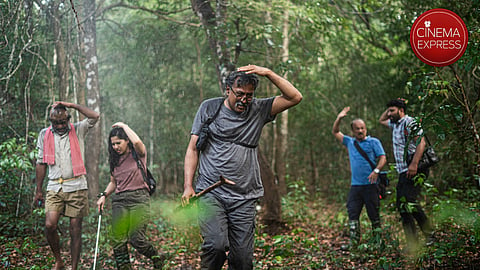Timmana Mottegalu Review: A slow-burning fable of forest, faith, and fate
Timmana Mottegalu (3 / 5)
Timmanna Motegalu opens with an evocative instrumental, an aural invocation of the forest's breath, its rhythm, and mystique. This prelude flows into a melodic tribute to the lush Malnad region, celebrating its rain-drenched beauty, forgotten traditions, and the ancestral wisdom of the Western Ghats. Adapted from Rakshit Thirthalli’s short story in Kaddina Nentaru, the film unfolds like a slow-burning folktale, rooted deeply in land, culture, and conscience.
Cast: Keshav Guttalike, Ashika Somashekhar, Suchendra Prasad, Sringeri Ramanna, Pragathi Prabhu, Raghu Ramanakppa, and Master Harsha
Director Rakshith Thirthahalli
At the heart of the film is Timma (Keshav Guttalike), a humble forest dweller whose house collapses in a storm. Desperate to rebuild, he seeks help from Venkataiah (Sringeri Ramanna), a Brahmin and spiritual figure who warns against disrupting nature’s order. His refusal to assist Timma sets the stage for a moral and philosophical dilemma—how far can one go to survive without betraying the very land that sustains them?
When a group of researchers and wildlife photographers, led by the focused and determined Vijay Kumar (Suchendra Prasad), enters the forest to study and conserve the king cobra, the narrative shifts. Their arrival disrupts the community’s fragile balance. Venkataiah, more a guardian of the forest's spiritual ethos, views the scientific mission as interference. But Timma, swayed by the lure of money, agrees to help the team find a cobra nest with rare eggs, despite his wife’s fear of divine retribution.
The real tension emerges from this triad: science, spirituality, and subsistence. The researchers, armed with logic and conservationist ideals, believe in data and ecological documentation. The locals, led by Venkataiah, see the forest not as a resource, but as a sacred entity governed by age-old beliefs. Timma is torn between his choices driven not by ideology, but by the sheer need to provide for his family.
The film’s strength lies in how it quietly critiques systems of knowledge and power. A subplot involving Timma’s son and his friend reveals how even children internalise the social divide between rich and poor, mirroring the adult world’s inequalities. Their conversation about dividing land isn’t just child’s play; it’s a sharp commentary on how ownership and exploitation begin early, ingrained into our understanding of nature and society.
As the team ventures into Hulinetti, a dreaded part of the forest steeped in lore, the film drifts into the surreal. Timma’s guilt manifests in dreamlike sequences where a divine presence, possibly the Naga Devatha, challenges his choices. These moments blend myth and morality, questioning the ethics of human ambition in sacred spaces.
The climax is both intimate and symbolic. Timma finally finds the eggs but at a personal cost. His son is missing. The forest, it seems, has exacted its price. What begins as a mission to rebuild a home becomes a journey through doubt, belief, and ultimately, self-reckoning. Is man the protector of nature, or its persistent violator? Keshav Guttalike brings quiet strength and authenticity to the role of Timma. His performance is grounded and emotionally resonant, perfectly capturing a man caught between tradition, survival, and conscience. The scenes featuring Timma’s son and his friend are particularly moving; their innocent yet revealing conversations about land ownership subtly reflect the early internalisation of class divides. It’s a thoughtful narrative device that adds a meaningful layer of social commentary. The score by Hemanth Jois is masterful—lyrical, ambient, and thematically rich. It never overpowers; instead, it echoes the moods of the forest and the people who live within it. Praveen’s cinematography is breathtaking. Every frame feels alive, teeming with the moist textures of Malnad—its mists, trees, and silences. The camera doesn’t just capture the forest—it reveres it. Timmanna Motegalu reflects on nature, need, and the ancient tension between faith and reason. It is a film that treats the forest not merely as a setting but as a sentient character—watchful, mysterious, and unwilling to be tamed.
Neither a full-fledged drama nor a conventional docu-drama, it entertains while delivering an understated but powerful message. In the end, Timmanna Motegalu doesn’t hand out clear answers. Instead, it nudges us to reflect: When survival, belief, and modern ambition collide in the heart of the forest, what do we protect—and what do we lose?

